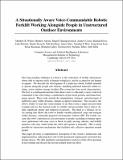A Situationally Aware Voice-commandable Robotic Forklift Working Alongside People in Unstructured Outdoor Environments
Author(s)
Walter, Matthew R.; Antone, Matthew; Chuangsuwanich, Ekapol; Correa, Andrew; Davis, Randall; Fletcher, Luke; Frazzoli, Emilio; Friedman, Yuli; How, Jonathan P.; Jeon, Jeong hwan; Karaman, Sertac; Luders, Brandon; Roy, Nicholas; Tellex, Stefanie; Teller, Seth; Glass, James R.; ... Show more Show less
Downloadwalter15.pdf (13.51Mb)
OPEN_ACCESS_POLICY
Open Access Policy
Creative Commons Attribution-Noncommercial-Share Alike
Terms of use
Metadata
Show full item recordAbstract
One long-standing challenge in robotics is the realization of mobile autonomous robots able to operate safely in human workplaces, and be accepted by the human occupants. We describe the development of a multiton robotic forklift intended to operate alongside people and vehicles, handling palletized materials within existing, active outdoor storage facilities. The system has four novel characteristics. The first is a multimodal interface that allows users to efficiently convey task-level commands to the robot using a combination of pen-based gestures and natural language speech. These tasks include the manipulation, transport, and placement of palletized cargo within dynamic, human-occupied warehouses. The second is the robot's ability to learn the visual identity of an object from a single user-provided example and use the learned model to reliably and persistently detect objects despite significant spatial and temporal excursions. The third is a reliance on local sensing that allows the robot to handle variable palletized cargo and navigate within dynamic, minimally prepared environments without a global positioning system. The fourth concerns the robot's operation in close proximity to people, including its human supervisor, pedestrians who may cross or block its path, moving vehicles, and forklift operators who may climb inside the robot and operate it manually. This is made possible by interaction mechanisms that facilitate safe, effective operation around people. This paper provides a comprehensive description of the system's architecture and implementation, indicating how real-world operational requirements motivated key design choices. We offer qualitative and quantitative analyses of the robot operating in real settings and discuss the lessons learned from our effort.
Date issued
2014-09Department
Massachusetts Institute of Technology. Computer Science and Artificial Intelligence Laboratory; Massachusetts Institute of Technology. Department of Aeronautics and Astronautics; Massachusetts Institute of Technology. Department of Electrical Engineering and Computer ScienceJournal
Journal of Field Robotics
Publisher
Wiley Blackwell
Citation
Walter, Matthew R., Matthew Antone, Ekapol Chuangsuwanich, Andrew Correa, Randall Davis, Luke Fletcher, Emilio Frazzoli, et al. “A Situationally Aware Voice-Commandable Robotic Forklift Working Alongside People in Unstructured Outdoor Environments.” J. Field Robotics 32, no. 4 (September 19, 2014): 590–628.
Version: Author's final manuscript
ISSN
15564959
1556-4967